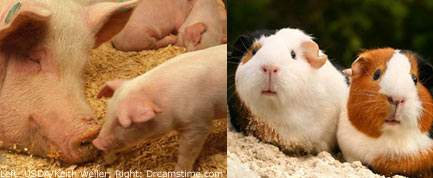This Is Not the Porky Pig Plague

What would you call this outbreak? Vote below.
***
Update 4/30/09: The World Health Organization on Thursday said it will stop calling this the swine flu. "Rather than calling this swine flu ... we're going to stick with the technical scientific name H1N1 influenza A," said WHO spokesman Dick Thompson. The story below remains as originally written.
***
Words matter. Just ask the pork industry, which bemoans the labeling of the latest health scare as "swine flu."
Sales of pork are off, according to news reports. And for no good reason.
You can't get the flu from eating bacon or pork chops. Sure, if you don't cook your pork, you could get sick, but it would likely be some other bug, and you'd kind of deserve it. Cooked pork is safe, several scientists have said (including scientists with no ties to the pork industry).
Get the world’s most fascinating discoveries delivered straight to your inbox.
So the pork industry — which three years ago underwent a makeover by touting its dark meat as being a little darker — is now mounting (or at least actively promoting) a campaign to get the name of this disease changed. Officials at the U.S. Centers for Disease Control and Prevention are pondering a name change, too (but, oops, they've named their new web page www.cdc.gov/swineflu).
Among the candidates: The much less sexy "North American influenza," proposed by the World Organization for Animal Health, an international group that manages the fight against animal diseases. (Did you know that human deaths from animal diseases are on the rise?).
Unfortunate or inaccurate?
What's in a name? More than you know. And, if we're talking about science and health and possibly death, a little accuracy could be considered a good thing. So, some facts:
The evolution of the current flu virus strain is murky, but many scientists think swine (collectively pigs, hogs and wild boars) were involved. Some aren't so sure. No U.S. swine has died, though one child in Texas has, along with several human deaths in Mexico.
"It is currently unclear as to how widespread this strain is in the swine populations both in the U.S. or worldwide," said Paul Christopher Roberts, associate professor of virology at Virginia Tech's Center for Molecular Medicine and Infectious Diseases.
Flu viruses evolve quickly and can jump between animals, with birds being the most common carrier. The still not-so-dastardly avian flu (H5N1), which lurks in nature but has yet to become the pandemic that was predicted back in 2005, is by all accounts an accurate moniker for that strain, because it's killed millions of birds. The science supports the name.
"Aquatic avian species, (waterfowl, ducks and other migratory birds) are considered the major reservoir for influenza A viruses [which includes both avian and swine flu], since all known subtypes have been isolated from this diverse set of birds at one time or another," Roberts said in an email interview. "Influenza can cause illness in numerous species, including horses, domestic cats and dogs as well in some marine mammals such as seals and whales."
And, of course humans.
Peter Cowen, associate professor of epidemiology and public health at North Carolina State University, thinks the latest outbreak is being called swine flu partly because of the 1918 Spanish flu became known as a swine flu — even though it probably had a wild bird origin, he said. (Oh, and it might have started in Kansas, scientists now say.)
The pondering Feds
CDC acting director Richard Besser said yesterday the agency is pondering a name change.
"In the public, we've been seeing a fair amount of misconception, that by calling it swine flu, there could be transmission from pork products," Besser said. "And that's not helpful. ... And so we're discussing, is there a better way to describe this that would not lead to inappropriate actions on people's part?"
Science sometimes moves ploddingly, thoughtfully. Even in the face of clear confusion.
"So I don't know what decision will be made on that," Besser continued. "But any information you can share that this — when it's described as swine flu, that's the origin of the strain or one of the components of the strain. And not a reflection on how the disease is spread currently."
Cowen prefers this strain — which is not currently a pandemic despite how much that term's tossed around — be called simply H1N1. Totally lacking in glamour and not near as scary sounding, but certainly accurate.
Oh, and resist the temptation to, as one LiveScience reader suggested, call this the Porky Pig Plague. The term "plague" is typically reserved for bacterial diseases, not viral infections, Roberts said.
<script type="text/javascript" language="javascript" charset="utf-8" src="http://static.polldaddy.com/p/1578972.js"></script><noscript> <a href="http://answers.polldaddy.com/poll/1578972/">What should health officials call this outbreak?</a><span style="font-size:9px;">(<a href="http://answers.polldaddy.com">answers</a>)</span> </noscript>
- Video: The Truth about Pandemics
- Swine Flu Is Evolution in Action
- More Flu News & Information
Robert Roy Britt is the Editorial Director of Imaginova. In this column, The Water Cooler, he looks at what people are talking about in the world of science and beyond.
Robert is an independent health and science journalist and writer based in Phoenix, Arizona. He is a former editor-in-chief of Live Science with over 20 years of experience as a reporter and editor. He has worked on websites such as Space.com and Tom's Guide, and is a contributor on Medium, covering how we age and how to optimize the mind and body through time. He has a journalism degree from Humboldt State University in California.



